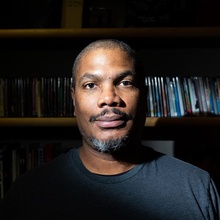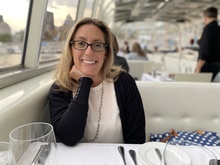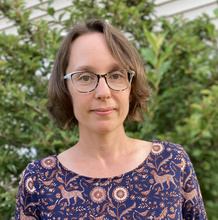Faculty in the College of Liberal Arts and Sciences are doing impactful and interesting work across disciplines. Learn more about the research, creative projects, and interests of Christopher Harris, Julianna Pacheco, and Elizabeth Yale.
Christopher Harris is the F. Wendell Miller Associate Professor and head of film and video production in the Department of Cinematic Arts.

What is the focus of your work?
I am an experimental filmmaker. I work with film like a visual artist or a poet—that is, I work alone for the most part and I use the medium for artistic, intellectual expression rather than commercial entertainment. The dominant mode of filmmaking is collaborative and commercial, but there is another tradition that is more self-consciously personal and subversive, critical, and counter-cultural. I work primarily in 16mm film, which is a commercially obsolete medium that was once primarily used for television commercials, industrial films, and educational films, but it also has a long tradition dating back to the mid-20th century of artistic experimentation. Working in this mode, I explore themes of African American historiography through formal experimentation with the physical properties of the film strip. Just as a painter uses pigment and canvas, I foreground the material of the 16mm film strip, light, shadow, and time to reflect on the complexities and paradoxes of African American experiences.
Tell us about the broad impact you’d like it to have.
For the kind of work I do, the impact is usually at a remove; though it doesn’t reach mass audiences in the way that commercial cinema does, it does have an impact within educational contexts—my work is screened and discussed in classrooms—which means that it is influencing coming generations of artists and thinkers. It is also screened in various venues such as the Museum of Modern Art, the Whitney Museum of American Art, the Academy Museum, the Cinémathèque Française in Paris, and film festivals and screening venues across north America, Latin America and Europe.
The ultimate impact of experimental films is subtle; it usually takes a while for ideas from the art world and experimental cinema, as well as academia, to filter out into the broader culture but it inevitably does. That’s where I hope my work will have an impact in the years to come.
What excites you about the environment in CLAS?
I am inspired by being in a context where my work is recognized and valued as it is in CLAS. I’m also inspired by being among so many artists and scholars with such vital and thriving research and creative work. Everywhere I look, I see that we have exciting work being done in every area of the college.
What are your hobbies and pursuits outside of work?
When possible, I love to hear great music live, usually avant-garde jazz if possible. I also try to go to a museum or art gallery whenever possible and wherever I happen to find myself in the world. I spend way too much time on Facebook because I have so many fascinating friends and acquaintances on there and I use it more for research than for anything else. I learn a lot from my brilliant friends on social media. Finally, I am always on the hunt for a great restaurant. Some of my best memories are related to flavors.
Any favorite things to do in Iowa City?
I have a couple of favorite restaurants in town. Watching films at FilmScene, attending art exhibits, artist talks, and performances at PS1, and seeing what’s new at Prairie Lights are some of my favorite things to do in Iowa City. Every once in a while, in the heat of the Iowa summer, I take the family for pie shakes. That’s a definite highlight of summertime in IC.
Julianna Pacheco is an associate professor in the Department of Political Science.

What is the focus of your work?
My work is at the nexus of political science and population health. My early work looked at the association between health and voter turnout as well as public opinion; more recently, I am interested in how political equality translates into health equity for marginalized communities, especially in Iowa. I am part of a three-person team (with Nicole Novak from the UI College of Public Health and Nicholas Salazar, President of LULAC) to investigate the effects of Iowa’s recent bill Senate File 413 on the voting power of Latinx communities across Iowa. This research is generously funded by the Robert Wood Johnson Foundation Interdisciplinary Research Leaders Program.
Tell us about the broad impact you’d like it to have.
In the long-term, we aim to increase Latinx turnout and elevate the voices of Latinx communities across Iowa. For the academic community, my hope is to contribute to the growing field of research on the political determinants of health.
What excites you about the environment in CLAS?
I thrive in environments that encourage innovative, interdisciplinary work. What excites me most about the CLAS environment is the support—whether it be through funding opportunities, faculty workshops, social media announcements of new research, or professional development awards—to do just that.
What are your hobbies and pursuits outside of work?
I love to travel, hike, run, and be with nature. This past year, I was able to do all those hobbies at once in Yellowstone where I ran my first half marathon. It was an amazing experience!
Any favorite things to do in Iowa City?
My favorite thing about Iowa City is the trail system. I love that I can hop on a trail from my house and, depending on how I feel that day, end up in North Liberty or take a ride that connects me to City Park. There is nothing better than a sunset ride on a hot summer night in Iowa City.
Elizabeth Yale is an assistant professor in the Department of History.

What is the focus of your work?
I study the history of science and the book in Europe—particularly Britain—from the 17th to the 19th century. These days, I’m especially interested in women’s roles in communicating and preserving scientific texts—everything from experimental notes to correspondence to books about science written for children—and the history of our understanding of human origins and evolution.
Tell us about the broad impact you’d like it to have.
As a historian of science, I hope that my work helps people to develop critical appreciation for science as a human endeavor. Understanding science as a human process for seeking truth about the world—with all that implies about science’s possibility and promise, but also its limitations—will help us tackle the big challenges that our society faces. If, through my research, I can contribute to building that understanding in some small way—especially among our students—I’ll be happy.
What excites you about the environment in CLAS?
There are so many opportunities for rich conversations with colleagues within and across departments, as well as across colleges (I’m also appointed in the Center for the Book, in the Graduate College). I love being able to investigate research questions from different historical perspectives and disciplinary angles. Right now, I’m also excited about finding ways to bring undergraduates into the research process.
What are your hobbies and pursuits outside of work?
Things that get me out of my own head, active with hands and feet, and spending time with family: walking in the woods and prairies, cooking and baking (and watching cooking shows), reading fiction, and making music are all mainstays.
Any favorite things to do in Iowa City?
Visiting local shops (RSVP is a favorite any time I need a birthday card) and enjoying performing arts and music—everything from plays at the Riverside Theatre, to the downtown summer jazz festival, to school band concerts.